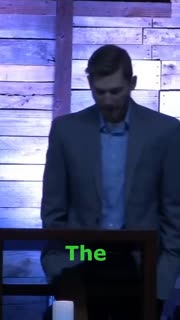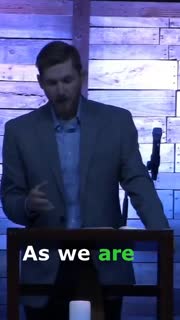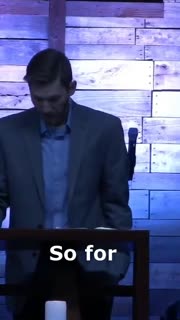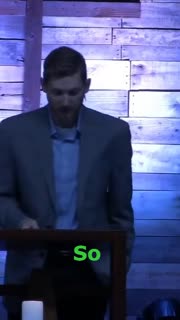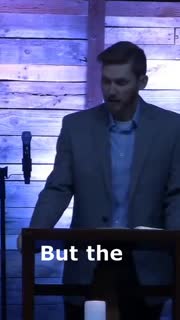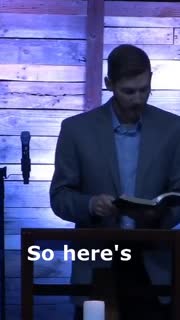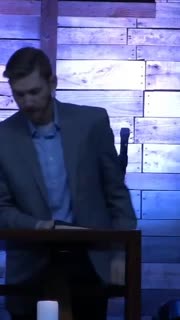Esther: Courage, Purpose, and Divine Intervention
Devotional
Sermon Summary
Bible Study Guide
Sermon Clips
### Quotes for Outreach
1. "The story has put a lot of things in perspective for me and I hope it has done the same for you as well. It's really helped me understand the way that the Old Testament prophets and the stories all begin to connect in this one larger story of God. How it's not just individual times and individual people, but they're all people together working towards the will of God. And I think that we're still living into that today as we are living out the New Testament, living into a relationship with Jesus. We are able to live out the will of God in our lives." (48 seconds)
2. "As we are disciples of Christ, it's more our relationship with Jesus is more about not just getting into heaven but heaven getting into us. So the upper story and the lower story begin to collide in us when we begin to be more like Jesus. When heaven gets more into us and we become more worried about God filling us than we are worried about just getting to heaven when we die." (39 seconds)
3. "So for Esther, she's put in a pretty tight spot. She has to decide if she's going to go before the king or not. And ultimately, she does. She decides this is more important for the people of God, for the Jewish people still living in this time and in this area. It's more important for me to go stand before the king than it is for me to just stand back and be silent." (31 seconds)
4. "So think about Parkview for a moment. Parkview was established almost a hundred years ago and we've come a long way. You have come a long way. Your families have been around in this church for a long time. But at that point when the church was planted and all along for such a time as this, we have been here to minister to people, to share the love of God with people." (29 seconds)
5. "So Esther risks her life for others to be saved. Are you willing? For such a time as this, what is the purpose of God in this place? I realize and looking back I've failed so many times trying to bring people to church, trying to get people involved in church. Ah boy, I took a friend with me to youth group one night and he walked home. He left church before it really even started. But you gotta ask, you gotta try. So you fail one time, doesn't mean that's the end. You keep trying, you keep inviting, you keep talking about Jesus to people and there's no telling what God will begin to do." (61 seconds)
### Quotes for Members
1. "But the book of Esther is one where we can see God's upper story and his lower story begin to collide. The more that I think about the upper and the lower, I was reading this morning and reminded of something. And it was the fact that as we are disciples of Christ, it's more our relationship with Jesus is more about not just getting into heaven but heaven getting into us. So the upper story and the lower story begin to collide in us when we begin to be more like Jesus. When heaven gets more into us and we become more worried about God filling us than we are worried about just getting to heaven when we die." (58 seconds)
2. "So here's the Jews going all the way back to King Saul. If he had just been obedient to God, maybe, just maybe, they wouldn't be in this place again. But Mordecai reminds Esther, maybe you are queen for just such a time as this. Maybe you're put into this place for just such a time to bring freedom to this Jewish people. Nobody else except for the queen could have found favor with the king quite like Esther had done." (44 seconds)
3. "So for Esther, she's put in a pretty tight spot. She has to decide if she's going to go before the king or not. And ultimately, she does. She decides this is more important for the people of God, for the Jewish people still living in this time and in this area. It's more important for me to go stand before the king than it is for me to just stand back and be silent. These are some of the most courageous words I think we read in all of scripture. She says, 'If I must die, I must die.' But I'm not going to give up without trying to save these people." (31 seconds)
4. "So Esther risks her life for others to be saved. Are you willing? For such a time as this, what is the purpose of God in this place? I realize and looking back I've failed so many times trying to bring people to church, trying to get people involved in church. Ah boy, I took a friend with me to youth group one night and he walked home. He left church before it really even started. But you gotta ask, you gotta try. So you fail one time, doesn't mean that's the end. You keep trying, you keep inviting, you keep talking about Jesus to people and there's no telling what God will begin to do." (61 seconds)
5. "So there's a lot to take away from Esther in her life. But most importantly is that we can be encouraged that God can strengthen us and he can give you courage. He can give you courage to come to him and lay down things on the altar that need to be done away with. He can transform you, your life today. He can bring freedom. He can bring peace and joy. He can help you in a time of grieving. God can do these things. But when you get up from that place, go and live with heaven inside of you rather than you trying to get into heaven. Know that God fills us beyond what we could ever imagine. God does things in us that we could never think possible." (57 seconds)
Ask a question about this sermon
1. "The story has put a lot of things in perspective for me and I hope it has done the same for you as well. It's really helped me understand the way that the Old Testament prophets and the stories all begin to connect in this one larger story of God. How it's not just individual times and individual people, but they're all people together working towards the will of God. And I think that we're still living into that today as we are living out the New Testament, living into a relationship with Jesus. We are able to live out the will of God in our lives." (48 seconds)
2. "As we are disciples of Christ, it's more our relationship with Jesus is more about not just getting into heaven but heaven getting into us. So the upper story and the lower story begin to collide in us when we begin to be more like Jesus. When heaven gets more into us and we become more worried about God filling us than we are worried about just getting to heaven when we die." (39 seconds)
3. "So for Esther, she's put in a pretty tight spot. She has to decide if she's going to go before the king or not. And ultimately, she does. She decides this is more important for the people of God, for the Jewish people still living in this time and in this area. It's more important for me to go stand before the king than it is for me to just stand back and be silent." (31 seconds)
4. "So think about Parkview for a moment. Parkview was established almost a hundred years ago and we've come a long way. You have come a long way. Your families have been around in this church for a long time. But at that point when the church was planted and all along for such a time as this, we have been here to minister to people, to share the love of God with people." (29 seconds)
5. "So Esther risks her life for others to be saved. Are you willing? For such a time as this, what is the purpose of God in this place? I realize and looking back I've failed so many times trying to bring people to church, trying to get people involved in church. Ah boy, I took a friend with me to youth group one night and he walked home. He left church before it really even started. But you gotta ask, you gotta try. So you fail one time, doesn't mean that's the end. You keep trying, you keep inviting, you keep talking about Jesus to people and there's no telling what God will begin to do." (61 seconds)
### Quotes for Members
1. "But the book of Esther is one where we can see God's upper story and his lower story begin to collide. The more that I think about the upper and the lower, I was reading this morning and reminded of something. And it was the fact that as we are disciples of Christ, it's more our relationship with Jesus is more about not just getting into heaven but heaven getting into us. So the upper story and the lower story begin to collide in us when we begin to be more like Jesus. When heaven gets more into us and we become more worried about God filling us than we are worried about just getting to heaven when we die." (58 seconds)
2. "So here's the Jews going all the way back to King Saul. If he had just been obedient to God, maybe, just maybe, they wouldn't be in this place again. But Mordecai reminds Esther, maybe you are queen for just such a time as this. Maybe you're put into this place for just such a time to bring freedom to this Jewish people. Nobody else except for the queen could have found favor with the king quite like Esther had done." (44 seconds)
3. "So for Esther, she's put in a pretty tight spot. She has to decide if she's going to go before the king or not. And ultimately, she does. She decides this is more important for the people of God, for the Jewish people still living in this time and in this area. It's more important for me to go stand before the king than it is for me to just stand back and be silent. These are some of the most courageous words I think we read in all of scripture. She says, 'If I must die, I must die.' But I'm not going to give up without trying to save these people." (31 seconds)
4. "So Esther risks her life for others to be saved. Are you willing? For such a time as this, what is the purpose of God in this place? I realize and looking back I've failed so many times trying to bring people to church, trying to get people involved in church. Ah boy, I took a friend with me to youth group one night and he walked home. He left church before it really even started. But you gotta ask, you gotta try. So you fail one time, doesn't mean that's the end. You keep trying, you keep inviting, you keep talking about Jesus to people and there's no telling what God will begin to do." (61 seconds)
5. "So there's a lot to take away from Esther in her life. But most importantly is that we can be encouraged that God can strengthen us and he can give you courage. He can give you courage to come to him and lay down things on the altar that need to be done away with. He can transform you, your life today. He can bring freedom. He can bring peace and joy. He can help you in a time of grieving. God can do these things. But when you get up from that place, go and live with heaven inside of you rather than you trying to get into heaven. Know that God fills us beyond what we could ever imagine. God does things in us that we could never think possible." (57 seconds)
